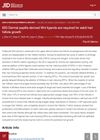5 citations
,
January 2021 in “Frontiers in Cell and Developmental Biology” Inhibiting Zyxin may help treat androgenetic alopecia by promoting hair growth.
 22 citations
,
October 2020 in “Frontiers in Cell and Developmental Biology”
22 citations
,
October 2020 in “Frontiers in Cell and Developmental Biology” Fisetin, a type of polyphenol, may help hair grow by increasing certain protein activities in cells.
8 citations
,
January 2020 in “International Journal of Cosmetic Science” The combination of specific chemicals improves hair density in women.
 35 citations
,
January 2020 in “Skin Pharmacology and Physiology”
35 citations
,
January 2020 in “Skin Pharmacology and Physiology” The review concluded that keeping the hair-growing ability of human dermal papilla cells is key for hair development and growth.
 16 citations
,
October 2019 in “Biological & Pharmaceutical Bulletin”
16 citations
,
October 2019 in “Biological & Pharmaceutical Bulletin” Houttuynia cordata extract may help hair grow by improving cell survival and increasing cell growth.
 117 citations
,
August 2019 in “Drug Design Development and Therapy”
117 citations
,
August 2019 in “Drug Design Development and Therapy” Minoxidil effectively treats hair loss, but use cautiously and monitor side effects.
 13 citations
,
March 2019 in “Journal of Dermatological Treatment”
13 citations
,
March 2019 in “Journal of Dermatological Treatment” Finasteride can treat hair loss, but may have side effects; evaluate and inform patients of risks.
 148 citations
,
December 2018 in “Journal of autoimmunity”
148 citations
,
December 2018 in “Journal of autoimmunity” Alopecia areata is an autoimmune disease causing patchy hair loss, often with other autoimmune disorders, but its exact causes are unknown.
23 citations
,
April 2018 in “PubMed” Topical finasteride reduces hair loss and promotes hair growth in men and women.
 145 citations
,
November 2017 in “Journal of The European Academy of Dermatology and Venereology”
145 citations
,
November 2017 in “Journal of The European Academy of Dermatology and Venereology” Use minoxidil for hair loss treatment; assess results after 6 months.
 13 citations
,
March 2017 in “PubMed”
13 citations
,
March 2017 in “PubMed” People with a common type of hair loss have higher stress levels in their body, and treatments that reduce this stress could help.
 7 citations
,
March 2017 in “Actas Dermo-Sifiliográficas”
7 citations
,
March 2017 in “Actas Dermo-Sifiliográficas” Several new treatments for different types of hair loss show promise in improving patient quality of life.
 36 citations
,
February 2017 in “BMC Complementary and Alternative Medicine”
36 citations
,
February 2017 in “BMC Complementary and Alternative Medicine” Geranium sibiricum extract helps hair grow and is more effective than minoxidil but can be toxic in high concentrations.
 20 citations
,
January 2017 in “Actas Dermo-Sifiliográficas”
20 citations
,
January 2017 in “Actas Dermo-Sifiliográficas” Recent advances in hair loss treatments show significant progress.
 59 citations
,
November 2015 in “International Journal of Cosmetic Science”
59 citations
,
November 2015 in “International Journal of Cosmetic Science” Oxidative stress damages hair and contributes to aging, and managing it can help maintain hair health.
 120 citations
,
November 2014 in “Biological Reviews”
120 citations
,
November 2014 in “Biological Reviews” The telogen phase of hair growth is active and important for preparing hair follicles for regeneration, not just a resting stage.
 49 citations
,
November 2014 in “Journal of Medicinal Food”
49 citations
,
November 2014 in “Journal of Medicinal Food” Red Ginseng Extract may help human hair grow by activating growth pathways and blocking negative effects of certain hormones.
 223 citations
,
January 2014 in “International Journal of Molecular Sciences”
223 citations
,
January 2014 in “International Journal of Molecular Sciences” The conclusion is that proper signaling is crucial for hair growth and development, and errors can lead to cancer or hair loss.
 49 citations
,
April 2012 in “Phytotherapy Research”
49 citations
,
April 2012 in “Phytotherapy Research” Rosemary leaf extract may be an effective natural treatment for hair growth and male pattern baldness.
 6 citations
,
May 2011 in “Pharmacognosy Journal”
6 citations
,
May 2011 in “Pharmacognosy Journal” Many products for hair re-growth exist, but a perfect treatment without side effects has not yet been found.
 321 citations
,
December 2009 in “Journal of Dermatological Science”
321 citations
,
December 2009 in “Journal of Dermatological Science” Dermal cells are key in controlling hair growth and could potentially be used in hair loss treatments, but more research is needed to improve hair regeneration methods.
 759 citations
,
February 2009 in “Current Biology”
759 citations
,
February 2009 in “Current Biology” Hair follicles are complex, dynamic mini-organs that help us understand cell growth, death, migration, and differentiation, as well as tissue regeneration and tumor biology.
 269 citations
,
August 2002 in “Journal of The American Academy of Dermatology”
269 citations
,
August 2002 in “Journal of The American Academy of Dermatology” 5% minoxidil works better for hair growth and density, with minor irritation.
 239 citations
,
November 2000 in “Journal of The American Academy of Dermatology”
239 citations
,
November 2000 in “Journal of The American Academy of Dermatology” Finasteride doesn't effectively treat hair loss in postmenopausal women.
 227 citations
,
January 1998 in “Journal of Endocrinology”
227 citations
,
January 1998 in “Journal of Endocrinology” Cells from balding scalps have more androgen receptors than cells from non-balding scalps.



























